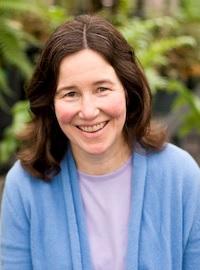
Professor Samuels has a B.Sc. in Neurobiology from McGill University in Montreal, and a Ph.D. in Botany, from the University of British Columbia in Vancouver, BC., Canada. She did post-doctoral studies at the University of Colorado, Boulder, USA and at UBC Vancouver, where she has been a faculty member since 2000.
Research in the Samuels laboratory focuses on biosynthesis of plant cell walls, both cell wall polysaccharides as well as specialized cell wall components, such as lipidic waxes on the plant surface and lignin in wood. The approach is to integrate advanced microscopy techniques with molecular biology and biochemistry to put cell wall biosynthesis and secretion into a cellular context.
Professor Samuels has also been involved in conducting various education research projects at UBC. She is dedicated to improving undergraduate education and is a champion for providing pedagogical training for graduate students and post-docs, including providing them with opportunities to be mentored in education research projects. This term she is teaching BIOL112 (Biology of the Cell) and a course for graduate students and post-docs titled “Foundations of Pedagogy”, which is offered by Centre for Integration of Research, Teaching, and Learning (CIRTL) at UBC (www.cirtl.ubc.ca).
What do you like best about being an Instructor?
I love to see the light in students’ eyes when they “get” something, or they see real world applications for the information that they are studying. Working with the other instructors, teaching assistants, and peer tutors is also fun.
How would you describe your teaching style?
My teaching style is always evolving. The goal of my teaching is to create an inclusive environment where the work is hard but doable. Shona Ellis is my role model in aiming for that sweet spot. I want to give students clear learning objectives, so they focus on what are the most important concepts in the course. Then I like to give them opportunities to be challenged to use those concepts in class. The idea that students advance their learning with help from a “More Knowledgeable Other” is key to constructivist theory of learning, based on Vygotsky’s concept that what a person can learn on their own is extended to a “Zone of Proximal Development” with expert help. In the world of Khan academy and Wikipedia, the university classroom must be a place for practice-feedback cycles with instructors setting high standards of critical thinking and metacognition (thinking about your thinking – does it make sense?). Finally, fair assessment of learning is key to my teaching style. I want students who have mastered application/critique/synthesis to outperform the diligent memorizing students.
What is something that you are currently doing in your course(s) or in the UBC teaching and learning space that you are excited about?
In BIOL112 this year, we are working with our teaching assistant team to generate new practice questions and exam questions. They are learning about alignment of learning objectives and assessment, and we get the benefit of their creativity.
What do you like to do in your spare time?
In my spare time, I am the institutional co-leader of the Centre for Research, Teaching, and Learning (CIRTL) at UBC. This is a network of research intensive universities from across North America dedicated to teaching STEM graduate students to teach in post-secondary science and engineering classrooms. My other hobby is being Director of the UBC Bioimaging Facility, a light and electron microscopy facility for researchers from across campus. In my non-spare time, I supervise undergraduate and graduate researchers in my plant cell biology lab, where we study plant cell walls and how cannabis flowers make their valuable metabolites.
What is a fun fact about you that people may not know?
I grew up in New Jersey.